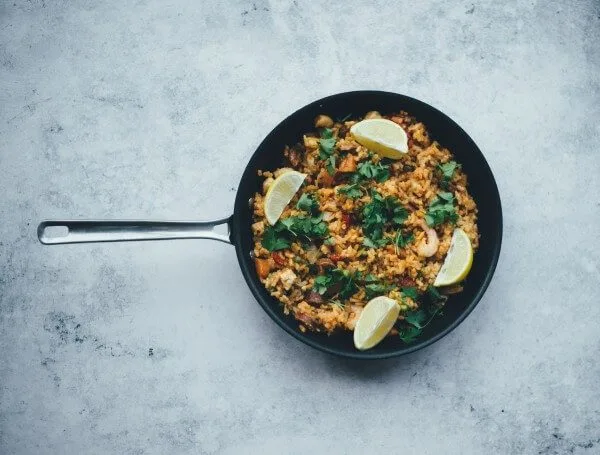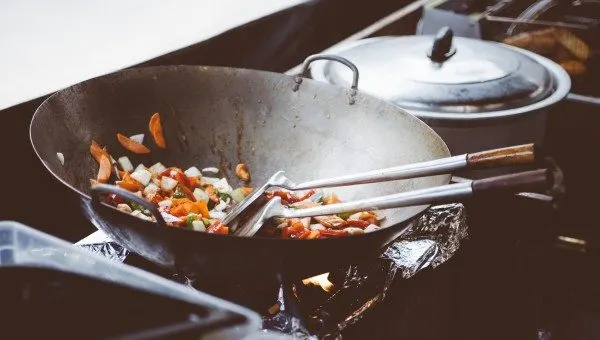Today we’ll cover the shelf life, storage, and spoilage of ghee.
Got a half-open jar of ghee that’s been open for who knows how long? That probably makes you wonder: does ghee ever go bad?
Or maybe you’ve just opened a fresh jar and want to know how long it’s good. How long does ghee last?
Either way, you’re probably looking for a short primer on ghee that will teach everything you need and nothing you don’t. And that’s exactly what you found.
Let’s get right into it.

Table of Contents
- Does Ghee Go Bad?
- How to Tell if Ghee is Spoiled?
- Does Ghee Need to Be Refrigerated?
- How Long Does Ghee Last?
- How to Store Ghee
- Ghee Shelf Life and Spoilage Summary
Does Ghee Go Bad?
Ghee lasts for at least 1 to 2 years, but it goes bad if you store it for too long or in poor conditions.
The most common way ghee spoils is by going rancid, which causes the fat to taste harsh and bitter, and sometimes alters the smell to one that might remind you of old paint or nail polish remover.
Some sellers may say ghee lasts forever, but that’s not really true – fats go rancid sooner or later.
That said, ghee stays good for months even without refrigeration because it consists mostly of saturated and monounsaturated fats, both more stable than polyunsaturated fats.
(Lard lasts a long time for similar reasons.)
That’s a long way to say that ghee lasts for months and doesn’t go rancid easily, but it goes bad sooner or later.
Rancidity isn’t the only possible sign that your ghee is spoiled. Let’s talk about others.
How to Tell if Ghee is Spoiled?
Discard ghee if:
- It’s turned white. White ghee is rancid, and it has to go.
- There’s mold or any other nasty “stuff” on the surface. Mold doesn’t typically grow on fats, but if your ghee got contaminated with food particles somewhere along the way, you might find some growth on the surface. You might consider removing the spoiled bit if it’s small, but tossing the whole thing is much safer.
- It gives off a funny smell. If it tastes like old paint, putty, or something similar, the fat is rancid. If there’s anything else off about the aroma, assume that the fat is spoiled too.
- It tastes harsh or bitter. Either is a sign the fat is rancid.
If you find anything else that seems off about the ghee, err on the side of caution. Better safe than sorry.
That said, let’s talk about two things that are normal for ghee and nothing to worry about.
Melting
Melting ghee is normal if you store it at a warm enough temperature. Other fats like coconut oil or bacon grease behave the same way.
Graininess
Graininess is caused by melting and re-solidifying of the fat and is expected if you store your ghee at room temperature during a hot summer.
If you’re bothered by it, you can melt the ghee entirely by warming it up, stirring it, and freezing it until solid. Then you can warm it back to room temperature and have it nice and smooth.
Don’t do that more than a couple of times. Otherwise, the quality of your ghee might deteriorate quite a bit due to warming it up multiple times.

Does Ghee Need to Be Refrigerated?
Ghee doesn’t require refrigeration, but it helps the fat retain quality for longer.
Many brands recommend keeping their ghee in the fridge, especially after opening the jar. Stored this way, open ghee should keep quality for about a year instead of about 3 to 6 months if you leave it unrefrigerated.
That said, some brands recommend storing ghee in the pantry even after opening, so there’s no right or wrong way of going about this.
One thing is for sure: if you expect that it’ll take you more than a few months to go through your ghee jar, it’s probably best to store it in the refrigerator.
If you’re like me and think of ghee as a dairy product, not fat that’s more similar to oil than butter, the fridge might seem the natural storage spot. If that’s the case, good for you.
Knowing that, let’s talk about the shelf life of ghee.
How Long Does Ghee Last?
| Pantry | Fridge | |
|---|---|---|
| Ghee, unopened | 1 – 2 years | 1 – 2 years |
| Ghee, opened | 4 – 6 months | 12+ months |
Unopened ghee lasts about two years, no matter if you refrigerate it or not. After opening, ghee keeps unrefrigerated for about 3 to 6 months, and approximately a year if stored in the fridge.
Every ghee jar comes with a date printed on the label.
That date is a best-by or use-by date, and it’s only a rough estimate of how long the fat should stay good. It’s not an expiration date by any means.
If you take good care of the fat, meaning you store it properly, it’ll most likely last beyond the printed date and the mentioned storage periods.
Unfortunately, there’s no way of telling exactly how long past the printed date ghee can last. Because of that, instead of going with the printed date or any other storage time estimate, it’s better to use your ghee for as long as it doesn’t show any signs of spoilage.
In other words, treat all the time estimates above with a grain of salt and pay more attention to the quality of your ghee.

How to Store Ghee
Store ghee sealed tight in a cool and dry place away from direct sunlight and heat sources. Choose whether you refrigerate it or not based on how long you need it to last, and make sure you seal the jar tight after every use.
When scooping, always use clean utensils and never double dip. This way, you don’t introduce any food particles into the fat, making it much more vulnerable to spoilage.
If you’re no longer comfortable using your ghee for cooking because it’s, say, too old or has taken on a bad taste, you can move it to your bathroom and use it as an eye makeup remover, skin moisturizer, or hair oil.
Of course, if your ghee smells bad, toss it. You definitely don’t want to use smelly ghee as a skin care product.
Ghee Shelf Life and Spoilage Summary
Thanks for reading this primer on ghee. Here are the takeaways:
- Ghee goes bad if you store it for too long or in poor conditions. It typically spoils by going rancid, which results in the fat tasting harsh and bitter. Ghee can also grow mold or “nasties” on the surface if contaminated.
- Refrigerating ghee isn’t necessary, but it helps the fat retain quality for longer, especially after opening. Open ghee keeps quality for about 3 to 6 months at room temperature and a year or more in the fridge. So transferring ghee to the refrigerator means you more than double the storage time.
- Unopened ghee lasts approximately two years before its quality starts to deteriorate noticeably. After opening, it keeps for 3 to 6 months unrefrigerated and a year or longer in the fridge. Remember that those periods are only estimates, and instead of relying on them, it’s better to use your ghee for as long as it’s not spoiled.